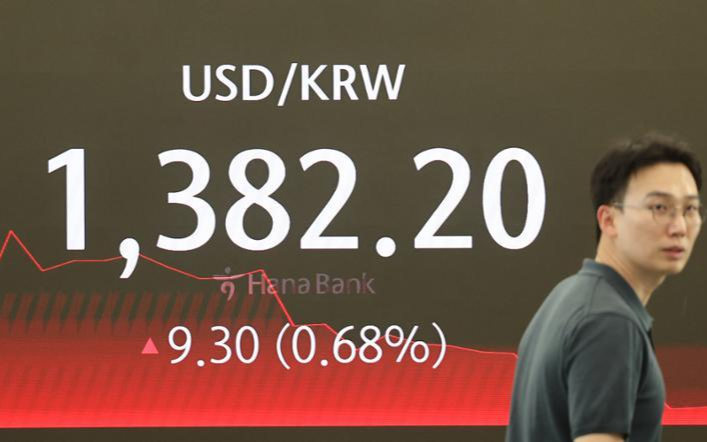
An electronic signboard at a Hana Bank dealing room in Seoul shows the local currency closed at 1,382.2 won against the U.S. dollar, April 19. Yonhap
The Korean currency has dropped more than 7 percent against the U.S. dollar so far this year, marking the sharpest fall since the 2008 global financial crisis amid geopolitical uncertainties and the resurgent dollar, data showed Sunday.
The Korean won closed at 1,382.2 won against the greenback Friday, down 7.3 percent from 1,288 won logged at the end of last year.
It marked the biggest drop since March 1990, when the country adopted the market average exchange rate system in place of the multiple-basket pegged system.
During the same period of 2008, Korea saw its currency tumble 6.9 percent against the greenback, and the figure for 2009 came to 5.8 percent.
Last week, the Korean won skidded to the closely watched level of 1,400 won during intraday trading, though verbal interventions by financial authorities capped further declines.
The dollar has strengthened against major counterparts as the U.S. economy has been more resilient than expected, raising bets the Federal Reserve will delay interest-rate cuts amid still-high inflation.
Geopolitical risks stemming from the Russia-Ukraine war and the escalating tensions in the Middle East have also sparked investors’ risk-averse sentiment.
During the first trilateral finance ministers’ meeting last week, top policymakers from Korea, the United States and Japan voiced “serious concerns about the recent sharp depreciation” of the Korean won and Japanese yen.
Policymakers said the recent won depreciation was somewhat excessive compared with other nations, given that the U.S. dollar index, which tracks the currency against six major peers, advanced 4.8 percent this year.
The drop of the Korean won was the seventh-largest level out of those seen in 26 major global currencies. Chile saw its currency drop 10 percent this year, followed by Japan with 9.8 percent, Sweden with 9 percent, Switzerland with 8.5 percent, Brazil with 8.1 percent and Argentina with 7.6 percent, according to Fed data.
“The government is now operating a 24-hour market monitoring system. Any further marked drop would be unlikely, though it would largely depend on how things will unfold in the Middle East,” a finance ministry official said.
Related ministries have been closely watching the movement and working on responses to minimize possible negative impacts of financial market volatility on exports, supply chains and the broader economy, he added.
Bank of Korea (BOK) Gov. Rhee Chang-yong told reporters Friday that the won-dollar exchange rate may be stabilized if tensions in the Middle East do not escalate further, while noting “many uncertainties” stemming from developments in the region. (Yonhap)














